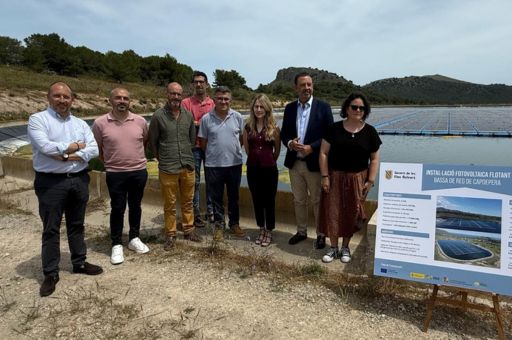This project, promoted by the Balearic Institute for Energy, has been carried out with an investment of €1,449,500.
The floating plant will prevent the emission of 1,000 tons of CO₂ annually into the atmosphere, and its electricity production could supply 650 households.
The Ministry of Business, Employment and Energy, through the Balearic Institute for Energy (IBE), has launched the largest floating photovoltaic installation in the Balearic Islands at the Capdepera irrigation pond. This facility comprises 2,528 solar panels spread across a surface area of 9,120 m² and was made possible thanks to an investment of €1,449,500.
TDB keeps you informed. Follow us on: Facebook, Twitter and Instagram
The Government Launches the Largest Floating Solar Installation in the Balearic Islands at the Capdepera Irrigation Pond, Generating 2.2 MWh
The project has a total peak power of 1,477.44 kWp and includes four inverters of 350 kWn each, totalling a capacity of 1,400 kWn.
The plant will generate clean, renewable energy capable of meeting the electricity needs of over 650 homes. Moreover, based on the projected annual energy output, it is estimated that the plant will prevent the emission of more than 1,000 tons of CO₂ into the atmosphere each year.
The Minister of Business, Employment and Energy, Alejandro Sáenz de San Pedro, visited the site this morning, accompanied by the Minister of Agriculture, Fisheries and Natural Environment, Joan Simonet; the Director General of Agriculture, Livestock and Rural Development, Fernando Fernández; and the Managing Director of the IBE, Hernando Rayo.
Sáenz de San Pedro emphasised the high level of coordination between ministries, which enabled the successful completion of the project. He also noted that one of the main goals of the initiative is not only to increase photovoltaic production, but also to reduce water evaporation and improve the plant’s cooling system.
Meanwhile, the Minister of Agriculture, Fisheries and Natural Environment, Joan Simonet, praised the launch of this installation and stated that both ministries would benefit. “On one hand, the installation utilises an existing space, such as the irrigation pond, and on the other, it generates energy that helps optimise irrigation,” he said, while also highlighting that “the solar panels help prevent water evaporation from the irrigation pond.”
One of the main advantages of this type of installation is that it does not require additional land and enhances water resource efficiency, as it significantly reduces water evaporation in the ponds. Additionally, the water layer contributes to the cooling of the panels, allowing for more efficient performance.
Currently, three similar installations are under construction in the irrigation ponds of the municipalities of Santa Maria del Camí, Consell, and Ariany, with a combined capacity of 2.1 MW. The electricity produced by these photovoltaic plants will be equivalent to the consumption of a municipality like Maria de la Salut.
These three new infrastructures, with a combined budget of €3,065,018.07, will reduce CO₂ emissions by 1,700 tons per year—comparable to planting 170,000 trees.
Additionally, the IBE is planning floating photovoltaic installations in the irrigation ponds of the municipalities of Inca (1.4 MW), Artà (2.8 MW), Ciutadella (0.5 MW), and Santa Eulàlia des Riu (0.5 MW).
The Ciutadella pond is expected to feature a pioneering direct current battery storage system in the Balearic Islands, with a storage capacity of 4,000 kWh.
